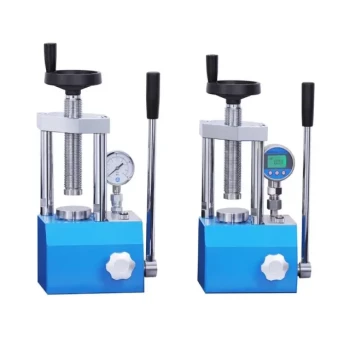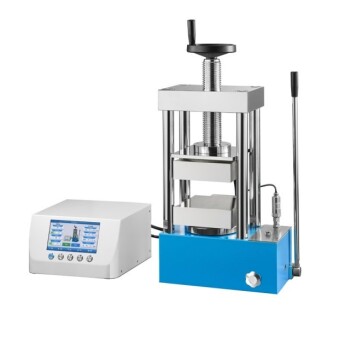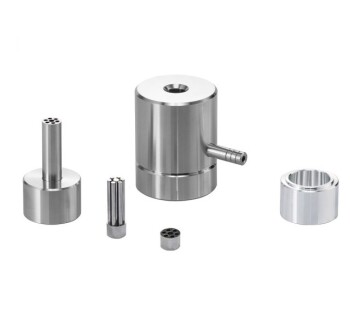At its core, a hydraulic press is versatile because its force, speed, and stroke can be infinitely adjusted for countless tasks, from stamping metal to compacting fine powders. Its precision stems from the fundamental nature of hydraulics, which allows for the application of full, consistent force at any point in the press's motion, ensuring uniform and repeatable results.
The true advantage of a hydraulic press is not just its raw power, but its ability to deliver that power with programmable and precise control. This transforms it from a simple brute-force machine into a highly adaptable manufacturing and research instrument.

The Core Principle: Force Without Compromise
The power of a hydraulic press is rooted in a simple law of physics known as Pascal's Principle. This principle states that pressure applied to a confined fluid is transmitted undiminished to every portion of the fluid and the walls of the containing vessel.
How Pascal's Principle Enables Force Multiplication
A small force applied to a small piston creates pressure in the hydraulic fluid. This pressure then acts on a much larger piston, generating a proportionally larger output force. This simple mechanism allows hydraulic presses to produce immense tonnage with a relatively small and efficient power source.
Full Force at Any Stroke Position
Unlike mechanical presses that only achieve maximum force at the very bottom of their stroke, a hydraulic press can deliver its full rated force at any point. This is critical for operations that require sustained pressure, such as deep drawing or compression molding, ensuring the material is formed correctly throughout the entire process.
Decoding the Versatility of Hydraulic Presses
The true value of a hydraulic press is its ability to adapt to a vast range of applications. This versatility is not a single feature but a combination of several key characteristics.
Adaptability Across Materials
Hydraulic presses excel at working with a diverse set of materials, including metals, plastics, rubber, and composites. The ability to precisely adjust pressure and, in some cases, heat, allows operators to fine-tune the process for each material's unique properties.
A Multi-Tool for Countless Operations
By simply changing the tooling (or dies), a single hydraulic press can perform an incredible variety of tasks. Common operations include forming, stamping, bending, punching, coining, riveting, and powder compacting.
Programmable Control and Automation
Modern hydraulic presses integrate sophisticated electronic controls. Operators can use pre-stored programs to quickly switch between jobs, ensuring consistent parameters for pressure, speed, and stroke length, which dramatically reduces setup time and human error.
The Source of Unmatched Precision
Precision is the ability to control the process and repeat it perfectly. Hydraulic systems are inherently suited for this due to the predictable nature of fluid dynamics.
Granular Control Over Pressure and Speed
The operator has complete control over the force exerted by the press. This allows for delicate assembly tasks at low pressure or massive forming operations at maximum tonnage, all from the same machine. The speed of the ram's approach, pressing, and retraction can also be independently controlled.
Consistent and Repeatable Results
Because the hydraulic system delivers consistent force regardless of stroke position, every part produced is subjected to the exact same conditions. This high degree of repeatability is essential for industries like automotive and aerospace, where component uniformity is non-negotiable.
Understanding the Trade-offs
While powerful and precise, hydraulic presses are not the universal solution for every application. Understanding their limitations is key to making an informed decision.
Speed Limitations
Generally, hydraulic presses are slower than their mechanical counterparts. For high-speed, high-volume stamping operations where precision force control is less critical, a mechanical press is often more efficient.
System Complexity and Maintenance
Hydraulic systems involve pumps, valves, seals, and fluid. This introduces a level of complexity that requires regular maintenance to prevent leaks and ensure optimal performance, which can be more involved than servicing a simpler mechanical press.
Making the Right Choice for Your Goal
Selecting the right press technology depends entirely on your specific manufacturing or research objectives.
- If your primary focus is high-volume, simple stamping: A mechanical press may offer a more cost-effective solution due to its superior speed.
- If your primary focus is forming complex shapes or working with varied materials: The precise force and speed control of a hydraulic press is indispensable for achieving quality results.
- If your primary focus is achieving maximum force and process control: A hydraulic press provides a level of power and programmability that is difficult to match with other technologies.
Ultimately, understanding these core principles empowers you to choose the tool that best aligns with your operational needs.
Summary Table:
| Feature | Benefit |
|---|---|
| Adjustable Force, Speed, Stroke | Enables customization for various tasks like metal stamping and powder compacting |
| Full Force at Any Stroke Position | Ensures uniform pressure for operations like deep drawing |
| Programmable Controls | Reduces setup time and human error with pre-stored programs |
| Material Adaptability | Works with metals, plastics, rubber, and composites for diverse applications |
| Consistent Repeatability | Delivers identical results for high-precision industries |
Ready to enhance your laboratory's capabilities with a hydraulic press? KINTEK specializes in lab press machines, including automatic, isostatic, and heated models, designed to deliver precise force control and versatility for your research and material testing needs. Contact us today to discuss how our solutions can optimize your processes and drive innovation in your lab!
Visual Guide

Related Products
- Automatic Laboratory Hydraulic Press Lab Pellet Press Machine
- Laboratory Hydraulic Press 2T Lab Pellet Press for KBR FTIR
- Manual Laboratory Hydraulic Pellet Press Lab Hydraulic Press
- Laboratory Hydraulic Press Lab Pellet Press Button Battery Press
- Manual Heated Hydraulic Lab Press with Integrated Hot Plates Hydraulic Press Machine
People Also Ask
- How are hydraulic pellet presses used in educational and industrial settings? Boost Efficiency in Labs and Workshops
- What is the purpose of creating pellets for XRF spectroscopy using a hydraulic press? Ensure Accurate and Repeatable Elemental Analysis
- How do hydraulic pellet presses contribute to material testing and research? Unlock Precision in Sample Prep and Simulation
- What are the limitations of hand-operated presses? Avoid Sample Compromise in Your Lab
- How does a hydraulic press aid in XRF spectroscopy? Achieve Accurate Elemental Analysis with Reliable Sample Prep



















